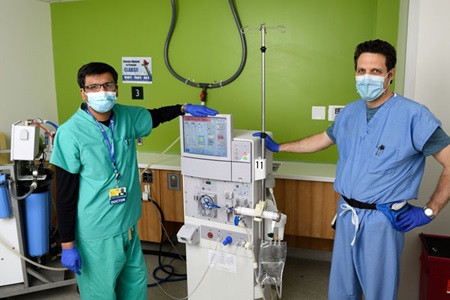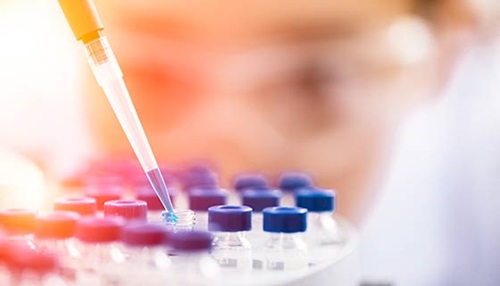Coronavirus: Kidney Damage Caused by COVID-19
Featured Expert:
Does COVID-19 affect the kidneys? It can. In addition to attacking the lungs, the coronavirus that causes COVID-19 — officially called SARS-CoV-2 — also can cause severe and lasting harm in other organs, including the heart and kidneys.
C. John Sperati, M.D., M.H.S., an expert in kidney health, discusses how the new coronavirus might affect kidney function as the illness develops and afterward as a person recovers.
COVID-19 Kidney Damage: A Known Complication
Some people suffering with severe cases of COVID-19 will show signs of kidney damage, even those who had no underlying kidney problems before they were infected with the coronavirus. Signs of kidney problems in patients with COVID-19 include high levels of protein or blood in the urine and abnormal blood work.
Studies indicate more than 30% of patients hospitalized with COVID-19 develop kidney injury, and more than 50% of patients in the intensive care unit with kidney injury may require dialysis. Sperati says early in the pandemic, some hospitals were running short on machines and sterile fluids needed to perform dialysis.
“As general treatments for patients with COVID-19 have improved, the rates of dialysis have decreased. This has helped to alleviate shortages, although intermittent supply chain disruptions remain a concern.
“Many patients with severe COVID-19 are those with co-existing, chronic conditions, including high blood pressure and diabetes. Both of these increase the risk of kidney disease,” he says.
But Sperati and other doctors are also seeing kidney damage in people who did not have kidney problems before they got infected with the virus.
How does COVID-19 damage the kidneys?
The impact of COVID-19 on the kidneys is complex. Here are some possibilities doctors and researchers are exploring:
Coronavirus might target kidney cells
The virus itself infects the cells of the kidney. Kidney cells have receptors that enable the new coronavirus to attach to them, invade, and make copies of itself, potentially damaging those tissues. Similar receptors are found on cells of the lungs and heart, where the new coronavirus has been shown to cause injury.
Too little oxygen can cause kidneys to malfunction
Another possibility is that kidney problems in patients with the coronavirus are due to abnormally low levels of oxygen in the blood, a result of the pneumonia commonly seen in severe cases of the disease.
Cytokine storms can destroy kidney tissue
The body’s reaction to the infection may be responsible as well. The immune response to the new coronavirus can be extreme in some people, leading to what is called a cytokine storm.
When that happens, the immune system sends a rush of cytokines into the body. Cytokines are small proteins that help the cells communicate as the immune system fights an infection. But this sudden, large influx of cytokines can cause severe inflammation. In trying to kill the invading virus, this inflammatory reaction can destroy healthy tissue, including that of the kidneys.
COVID-19 causes blood clots that might clog the kidneys
The kidneys are like filters that screen out toxins, extra water and waste products from the body. COVID-19 can cause tiny clots to form in the bloodstream, which can clog the smallest blood vessels in the kidney and impair its function.
Johns Hopkins Team Develops Method to Make Dialysis Fluid for Patients with COVID-19

When New York-based hospitals started running out of dialysis fluid for the type of dialysis used in intensive care, a team from Johns Hopkins answered the call.
Coronavirus Kidney Damage: A Serious Sign
Organ systems like the heart, lungs, liver, and kidneys rely on and support each other’s functions, so when the new coronavirus causes damage in one area, others might be at risk. The kidneys’ essential functions have an impact on the heart, lungs and other systems. That may be why doctors note that kidney damage arising in patients with COVID-19 is a possible warning sign of a serious, even fatal course of the disease.
Can kidneys recover after COVID-19?
Sperati says, “Patients with acute kidney injury due to COVID-19 who do not require dialysis will have better outcomes than those who need dialysis, and we have seen patients at Johns Hopkins who recover kidney function. We have even had patients in the ICU with acute kidney injury who have required dialysis, and subsequently regained their kidney function.”
He notes that patients with acute kidney injury requiring dialysis are much more likely to die than patients without acute kidney injury. In those who survive, approximately a third will not regain complete kidney function by the time of discharge from the hospital.
Should I keep taking my high blood pressure medication?
Hypertension (high blood pressure) is a common cause of kidney problems. Hypertension damages the blood vessels of the kidneys and affects their ability to filter the blood. Kidneys also help to regulate blood pressure, so kidney damage can make hypertension worse. Over time, hypertension can cause kidney failure.
If you are living with hypertension, you might take medication for the problem. You may be reading news reports questioning the safety of taking certain prescription medicines to manage their condition: ACE inhibitors and angiotensin receptor blockers (ARBs).
Sperati says multiple studies have confirmed that ACE inhibitors and ARBs do not increase the risk for complications in patients with COVID-19. Staying the course with your prescriptions, he adds, can lower the risk of heart and kidney damage from unchecked high blood pressure.
He does recommend patients with kidney issues stay away from non-steroidal anti-inflammatory drugs (NSAIDs), such as ibuprofen and naproxen. These can raise blood pressure and increase fluid volume in the body, which puts strain on the kidneys.
Research is revealing more about SARS-CoV-2 kidney damage
Researchers have learned a lot about kidney damage in COVID-19 since the start of the pandemic. Sperati, who also conducts research on kidney disease, says the Johns Hopkins Division of Nephrology is exploring exactly how SARS-CoV-2 — and the body’s response to it — is affecting kidney health.
He says that patients with COVID-19-related kidney damage should follow up with their doctors to ensure kidney function is returning to normal. Lasting kidney damage might require dialysis or other therapies even after recovery from COVID-19.
Mostly, Sperati stresses the importance of adhering to the basics of prevention, including staying up to date on COVID-19 vaccines and boosters, physical distancing, masking, and hand-washing. “For everyone, especially people with underlying chronic disease, avoiding infection with COVID-19 is important,” he says.






